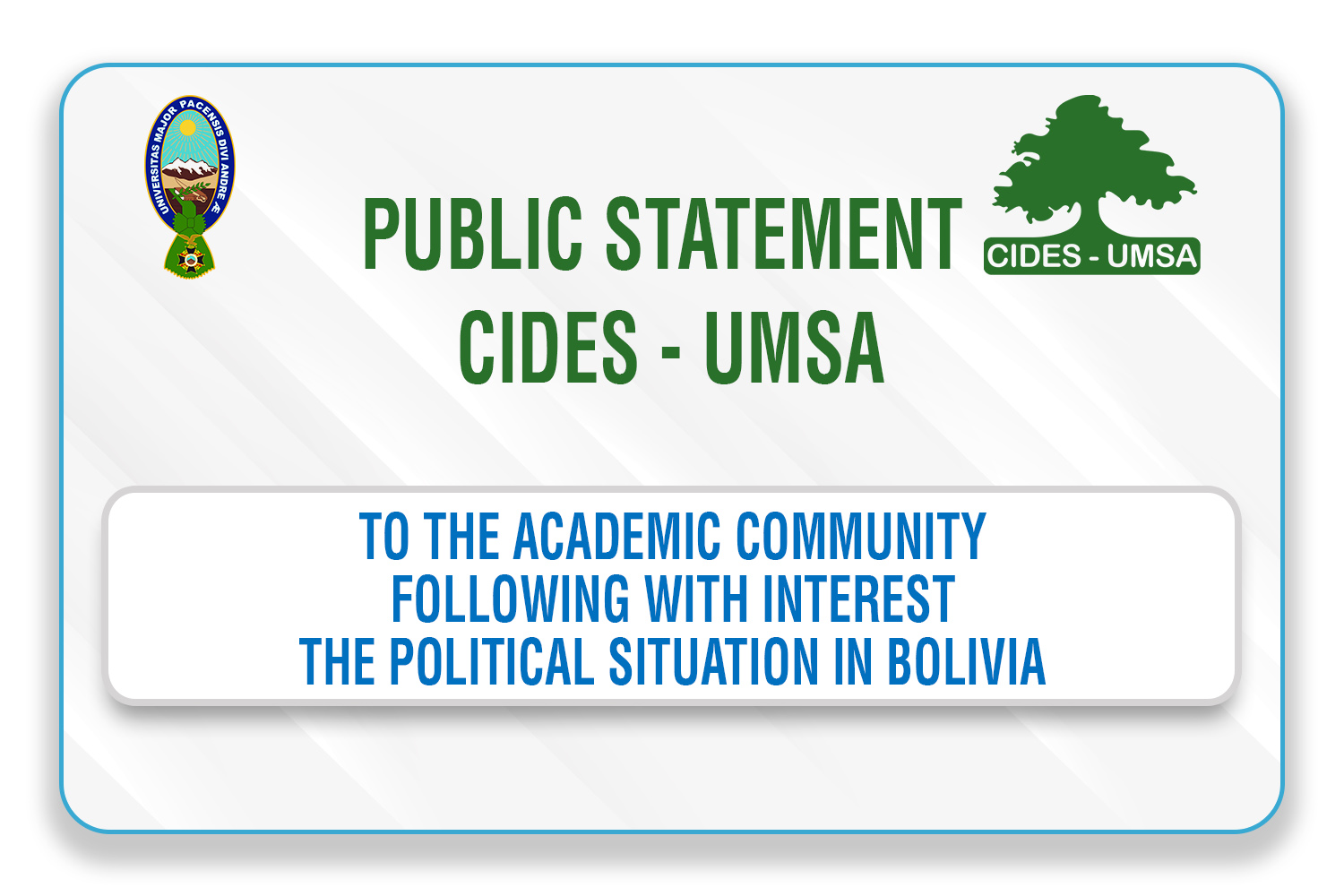UNIVERSIDAD MAYOR DE SAN ANDRÉS
POSTGRADO EN CIENCIAS DEL DESARROLLO
Formando recursos humanos para el país. Contribuyendo al conocimiento de la realidad.

The faculty and researchers at the Graduate Program in Development Sciences at the Universidad Mayor de San Andrés (CIDES-UMSA) manifest our indignation against the simplistic interpretations by colleagues and institutions from abroad regarding political events that are still ongoing in Bolivia.
Since prematurely affirming that a coup d’état took place in Bolivia, these interpretations have drawn conclusions that suggest a lack of knowledge of the diversity of stakeholders mobilizing in recent weeks, months and years. Their legitimate claims reflect their democratic aspirations and have most recently emerged from growing uncertainty of the results of the elections of October 20. In this context, the protests, particularly by youth, are the result of a long accumulation of distrust regarding the Movimiento al Socialismo (Evo Morales party, MAS), the government party that systematically fed on the deinstitutionalization in the country through the abuse of power and the privileging of partisan interests. The OAS report on national elections pointed out serious electoral irregularities and gave credibility to protestors and contributed to the situation taking on the form of a deep and dangerous state crisis.
Simultaneously with protesters demanding that their votes be respected, the crisis was deepened when Morales began to call the campesino bases of MAS to besiege cities and deprive residents of basic necessities as a measure to silence them. However, the strategy did not take into account that in Bolivia there is significant and widespread movement between rural and urban populations, increasing chances for confrontation. Indeed, with the exception of a significant proportion of residents of El Alto and other smaller cities whose inhabitants maintain a genuine sense of ethnic identification with the former President, there has been a profound distancing from the MAS government especially by urban populations.
This rupture has especially deepened in the department of Cochabamba, where the Chapare coca region is located, the political stronghold of MAS and where the most tragic events of collective sacrifice of the campesino movement are taking place in favor of the return of Evo Morales to power.
That said, the state crisis that Bolivia is experiencing today is largely the result of Evo Morales' decision to resign from his role as President, ratified when he went into exile and aggravated by the use of state assets for repression, not only while serving as President, but currently, given the apparatus of violence built on his mandate and that, since his resignation, has become an irregular structure of systematic intimidation against popular and middle class neighborhoods, which, in turn, have taken on positions of self-defense, again increasing chances of confrontation.
In this context, the Bolivian people are currently in the midst of a clear absence of state and a fragile process of rebuilding democratic institutions that allow them to fully exercise their self-determination, the recovery of authentic notions of diversity and complementarity that characterizes, the overcoming of authoritarian leaders and clientelist mirages of power that favor confrontation and violence between citizens, of which the most affected are usually the marginalized groups.
We call on the academic community that accompanies the political processes in Bolivia, to prioritize calls for pacifying the country, absolute respect for fundamental, civil and political rights and constitutional guarantees, assuming as a shared objective overcoming the current moment of crisis, seeking reconciliation and avoiding all forms of censorship, repression and political persecution wherever it comes from, always in order to preserve, strengthen and deepen not only our democracy, but our existence as an organized society.
18 November, 2019